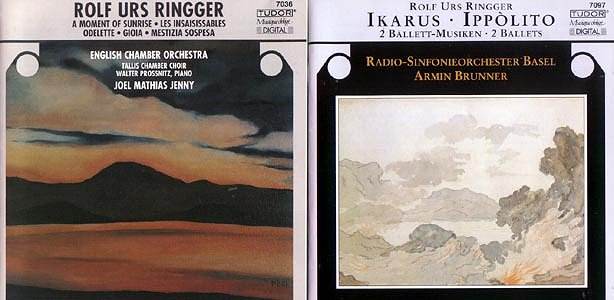Rolf Urs Ringger (b1935, Zurich) is a prolific
Swiss composer whose music is played regularly in his native country
and in New York, and has been performed in London and Manchester. At
contemporary music festivals one often makes the first acquaintance
of a composer with a single new work, which can be unrepresentative.
Ringger's Le Luci de Prometeo at Lucerne
left equivocal feelings, partly because of its context in a generally
unsatisfactory choral concert.
Two CDs from Tudor fill out the picture, their excellent booklets having full notes and revealing interviews with the composer. There are four ballets (none of them full length) on classical Greek themes, the two here dealing with the myths of Icarus, who is fatally burnt by the Sun, and that of the fateful attraction between Theseus's wife Phedre and her step-son Hyppolitus.
Ringger lives partly in the Italian Tessin and celebrates the intensity and clarity of light there in many of his scores, with a predilection for the bright timbres of xylophone, vibraphone & harp, percussion used for colour more than for force and power. He has long been fascinated by ballet, and his music always seeks to convey 'optical content and moods'; he sees his narrative ballets 'almost as operas without sung words' (he has not yet received an opera commission) and they are very much in the tradition of tone poems such as those of Strauss and Elgar, now a less fashionable genre. I found the colourful and accessible Icarus ballet music the more compelling, its phases clearly deliniated, with Water leading Daedalus and Icarus to the sea, Air inspiring flying, Icarus over-reaching himself by soaring too high and falling into the Sea. Ippolito shared my worry with the new work at Lucerne, a tendency to anticipate more vigorous movement which never quite comes - the 'round dance of attraction and repulsion', which led finally to Phedre's suicide 'unable to stand the alternation of pursuit and rebuff any longer', passed me by.
The other CD, of shorter works 1984-93, has local interest, having been made in London with the English Chamber Orchestra and the Tallis Chamber Choir, whose director is Philip Simms, organist of Thomas Tallis's own church at Greenwich. Joy conveys luminous brightness of the South, with harp, celesta and rich percussion prominent, Con slancio is a short playful piece with a cadenza involving also vibraphone and glockenspiel. Cuando el fuego evokes many manifestations of fire and its associations. Addio has string music growing out of strokes on tubular bells. Dommage que... is an adagio aiming to 'a great fortissimo discharge - assonances with Mahler are allowed'!
A Moment of Sunrise, to a poem in English by the composer, evokes the wide horizons and peace of a Mediterranean island, counterpointed with a speaking choir which is a reminder of the 'nervous, hectic life' in a metropolis.
It has been rewarding to make a wider acquaintance with this thoughtful and articulate composer and his music, ample justification for my efforts to supplement a first live concert experience with a broader perspective, usually available even though needing to be sought out. Both CDs are well played and recorded and are welcome additions to my substantial collection of Swiss contemporary music.
Peter Grahame Woolf
![]() Radio-Sinfonieorchester
Basel/Armin Brunner
Radio-Sinfonieorchester
Basel/Armin Brunner ![]() TUDOR 7097 (Basel
Volkhaus 1991/1995) [77 mins]
TUDOR 7097 (Basel
Volkhaus 1991/1995) [77 mins] ![]() English Chamber
Orchestra/ Tallis Chamber Choir/Jol Mathias Jenny
English Chamber
Orchestra/ Tallis Chamber Choir/Jol Mathias Jenny ![]() TUDOR 7036 [62.00]
TUDOR 7036 [62.00]